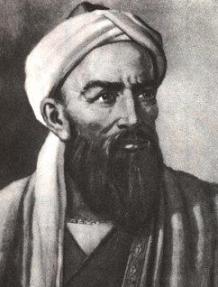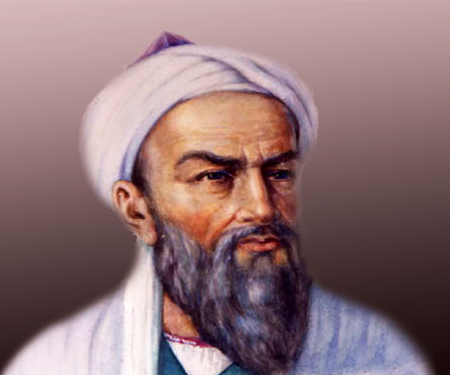AbÅ« RayḥÄn al-BÄ«rÅ«nÄ«
Abu ' r- Raihan Muhammad ibn Ahmad al -Biruni (Arabic أبو الريحان محمد بن أحمد البيروني, DMG Abū ' r - Raihan Muhammad al -Biruni Aḥmad b, . Persian only briefly ابوریحان بیرونی, Abu Raihan Biruni; * September 4 973 in the Khwarazmian capital Kath ( near present-day Khiva ), † December 9, 1048 in Ghazni (now in Afghanistan ) ) was a major choresmischer polymath, mathematician, cartographer, astronomer, astrologer, philosopher, pharmacologist, mineralogist, explorer, historian and translator from the heyday of Islam in Central Asia.
Life and work
The first 20 years he lived al -Biruni in Khorezm, where he has been trained at a young age by the scholar Abu Nasr Mansur ibn Iraq. As the ruling by Kath from Afrighiden Dynasty, which was close to al -Biruni, 995 was overthrown by the Mamuniden from Gurgandsch, he left the country and went to the court of the Samanid Mansur II to Bukhara. It was here at this time the well-known above all as a physician Ibn Sina, for many years worked with the al -Biruni. 998 he moved to Tabaristan and lived at the court of Ziyariden Qaboos, before he returned to his home to seven years for Gurgandschischen circle of scholars belonging to Khwarazm Shah Mamun II. Apparently he had previously concluded with the Mamuniden peace and the observation of a lunar eclipse on May 24, 997 in Kath shows that he must have visited Khorezm again sooner. Al -Biruni had then arranged with Abu'l- Wafa that this observed the event in Baghdad; by comparing the listed entry times the Earth's shadow, they were able to determine the difference in the longitudes of Kath and Baghdad. Al -Biruni employed at this time with astronomy, chronology and cartography.
1017 conquered the Ghaznawidensultan Mahmud of Ghazni Choresmien and took al -Biruni, Abu Nasr Mansur ibn Iraq and others as his prisoner by Ghazni. In the aftermath of Mahmoud al -Biruni received financial support for astronomical tasks. The observation of a solar eclipse on April 8, 1019 in Laghman north of Kabul, shows that he at least was able to move freely within the territory of Mahmud himself. He also determined the exact latitude of Kath From 1022 Mahmud ruled parts of northern India. Al -Biruni accompanied him on these campaigns. He was the first Muslim scientist who worked on the brahmin about science and comprehensively reported in Kitab al - Hind. He translated many Greek works into Arabic and Sanskrit, including Euclid's Elements. In 1023 he established a new measurement method he invented the radius of the globe to 6339.6 km. The radius at the equator of the earth actually is 6378.1 kilometers. Thus, certain al -Biruni the radius of the earth on the banks of Kabulflusses - then called Indus - with 6339.6 kilometers fairly accurate. Abu ' r- Raihan Muhammad al -Biruni constructed the first pycnometer. He determined the density ( specific gravity) of different materials.
Honors
A modern city in the area of al - Beruni birthplace in 1958 renamed in his honor in Beruniy. The University of Shiraz named their astronomical observatory Abu Reihan Observatory. The International Astronomical Union ( IAU) honored him by naming the lunar crater Al -Biruni.
Writings
Al -Biruni wrote about 146 books, with an estimated 13,000 pages in length and exchanged ideas with colleagues such as Avicenna ( Ibn Sina ) made by correspondence. About one-fifth of his work has survived, including:
- Al - Qanun al - Mas'udi, a devoted Sultan Mas'ud I of Ghazni Handbook of Astronomy
- " Book of instruction in the beginnings of the art of astrology "
- Pharmacognosy, an alphabetical list of medicinal plants and food
- Kitab al - Dschamahir ma'rifat fi al - dschawahir a book on minerals
- Kitab al - Tahdid nihayat amakin li - tashih masafat al - Masakin a book on Geodesy
- Kitab al - Hind Tuarikh, a book on the history of India
- Kitab al - Athar al - baqiya to al - qurun al - chaliya ( "Book of the legacies of earlier centuries "), a the Ziyariden Qaboos dedicated work of history ( built around 1000) - English translation of Sachau: The chronology of ancient nations ( digitized )










